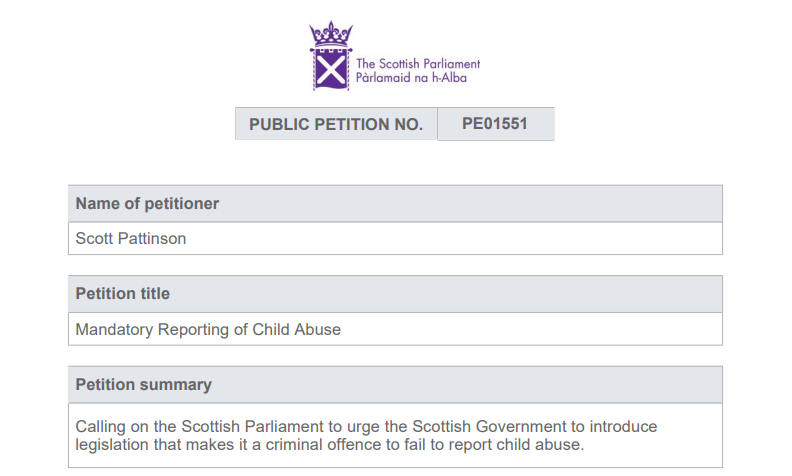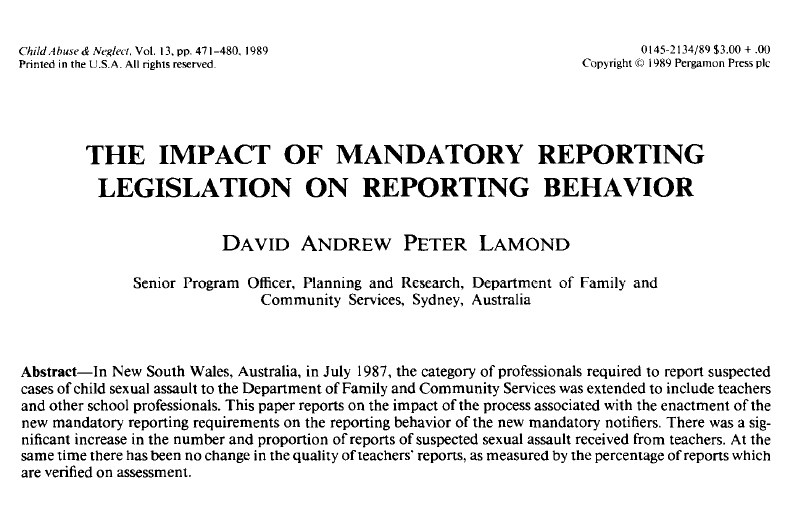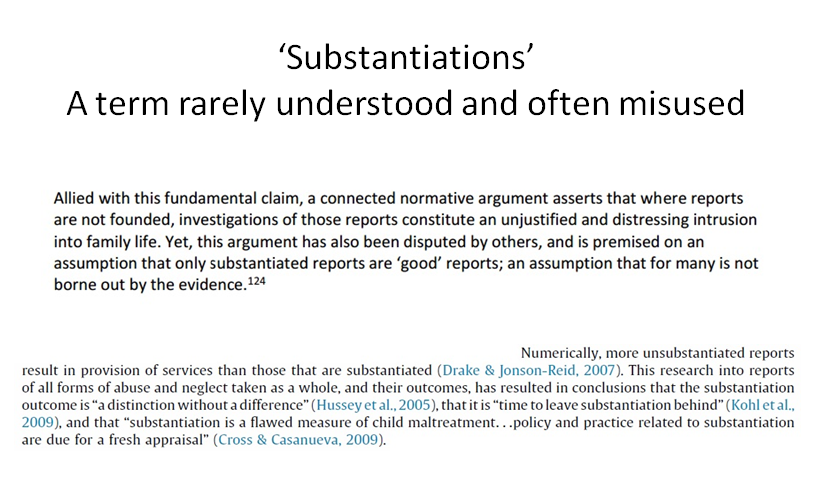On 22nd October 2020 an article by Dr Sarah Nelson of the Centre for Research for Families and Relationships appeared in The Scotsman.
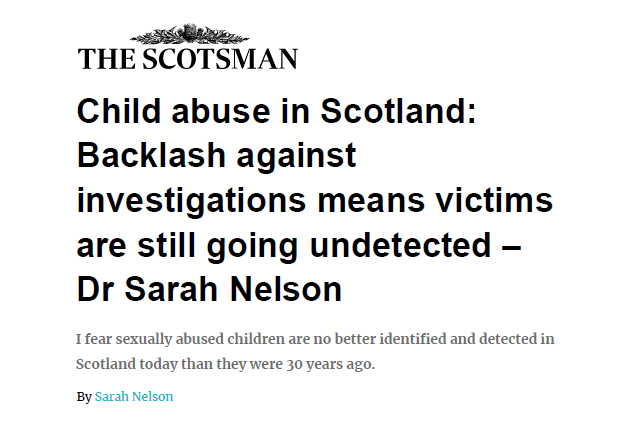
The reader is informed :
- Identification of child sexual abuse (“CSA”) has “dropped like a stone” since the 1990s.
- CSA is being allowed to disappear off the radar overshadowed by neglect and emotional abuse.
- Little sign this has changed since 2013 when it was highlighted.
- CSA now less than 5% of case conferences involving fewer than 300 children across Scotland who are identified in this way. (Scotland population 5.45m 2019)
- There is gross under identification as data provided in the article indicates.
The article considers the causes
- Backlash against CSA investigations in the past has created a hyper cautious culture to reporting.
- Adults fear asking leading questions.
- Adults wait for children to disclose but most children do not disclose.
- The differences between child sexual exploitation (“CSE”) that occurs outside the family and CSA that occurs inside the family.
- When disclosures happen authorities ‘rush in’ because insufficient evidence is available.
Author suggests change is needed including :
- A national review into the causes for the decline in CSA identification and the mushrooming of ‘neglect and emotional abuse.’
- Greater resources to investigate growth in abusive images online
- Detailed training to build confidence on CSA, its signs, and common impacts.
- Assertive approaches to countering CSA needed.
- Sexual health clinics to be educated of coercion and questioning about same.
- If there are disclosures ‘slow down’ the investigative process and provide space instead of authorities rushing in.
- ‘Children’s houses’ also suggested.
There are several stand out elements in the article including the shocking under identification of children being sexually abused in Scotland. Dr Nelson makes a number of suggestions to improve the situation. Notably this excludes the introduction of Mandatory Reporting (“MR”) of known and suspected child sexual abuse by those working in settings such as education, healthcare, sport and faith. Yet some form of MR exists in 81% of countries in the rest of the world. To understand why Dr Nelson did not include this key safeguarding component in her article we refer to Petition PE01551 lodged in the Scottish Parliament on 21 Jan 2015 in which a petitioner sought the introduction of Mandatory Reporting of an unspecified design. Dr Nelson made a submission to it dated 20/4/2015 which we review below and which is important given the depressing safeguarding landscape she reveals in The Scotsman article. Our comments below are in italics.
The petitioner sought the introduction of a criminal offence for failing to report child abuse via an unspecified design of the law to be applied to the Scottish equivalent of what are defined in England and Wales as ‘Regulated Activities’ (“RA”) i.e. personnel who work in settings in which children are in the care of adults other than their parents. We’ll apply the acronym throughout this article.
The petitioner presents MR as a ‘failing to report’ law which looks at MR through the wrong end of the telescope. First and foremost, well-designed MR is supportive of good staff and provides legal immunity to reporters when a referral made in good faith is not subsequently made out in law. Prosecutions for failure to report in MR jurisdictions are low. Variations of MR law, which is not ‘off the shelf’ legislation, exists in 81% of countries in the world including 86% of Europe, second only to the Americas with 90% of jurisdictions.
Here is Dr Nelson’s full submission dated 20/4/15.
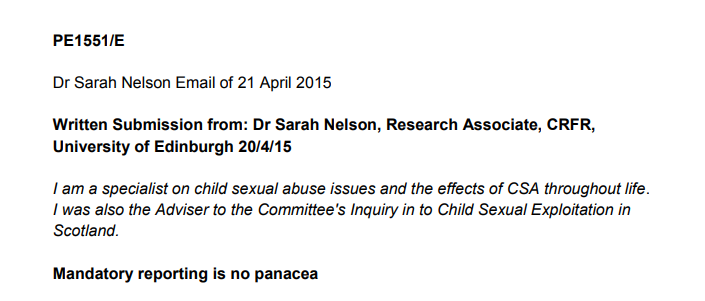
The ‘no panacea’ title of Dr Nelson’s submission informs the reader of the direction of travel. In it she suggests now is not the time for (mandatory reporting) law. The position could imply there might be such a time provided the options suggested in the article have been explored. Meanwhile the collateral cost of MR rejection is children who would otherwise be identified and protected by the presence of well-designed MR being left to an unknown fate. The article provides the shocking rate of under-reporting in Scotland. It’s safeguarding failure on a grand scale. The Governments of England, Wales and Scotland don’t like MR for reasons that have nothing to do with safeguarding children.
The article observes that (i) child sexual abuse is being forgotten and (ii) neglect in the family is dominating safeguarding.
We agree, but omitted from the piece is an explanation that safeguarding framework is dominated by child neglect which is at the heart of social work practice. The framework is then misapplied to complex and strategically important Regulated Activities which have entirely different safeguarding challenges and demands (bio for Professor Mathews). Consequently the framework fails good staff who work in these settings and the children for whom they care. Prior to the long-delayed and mischievously constructed ‘Reporting and Acting on Child Abuse and Neglect’ consultation many academics, NGO’s and ‘professionals’ working in this realm believed mandatory reporting already existed. Having now discovered it doesn’t they don’t want it. Dr Nelson’s submission reveals a non-appreciation of mandatory reporting which is disappointing given her ‘wish list’ in the article.
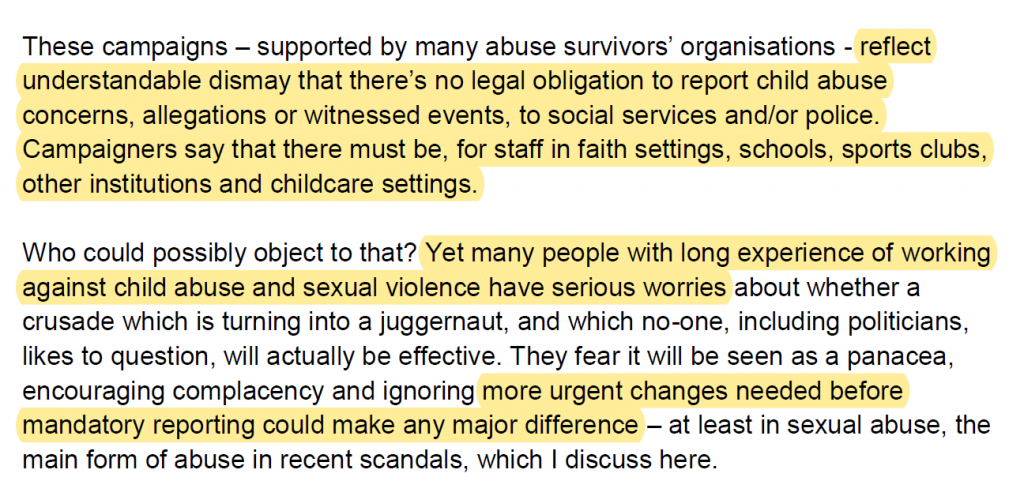
No supporting evidence for these ‘worries’ is offered. It is argument from authority which assumes that people with long experience of working against child abuse are necessarily right. The ‘panacea’ assertion is also mistaken as the link to our social media account in the next paragraph evidences. It’s not something we have ever said – rather well-designed mandatory reporting is a ‘vital component’ of a functioning safeguarding framework. Crusade, juggernaut, panacea, combined with a soupçon of we know better, and all in a single paragraph. It’s heady stuff.
There is no panacea to child abuse. Whoever has said there is? Our position has been clear since well before this petition arrived in the Scottish Parliament and it’s grounded on evidence.

It is a serious error to suggest MR should only apply to senior management of an organisation. But this has not stopped the NSPCC ignoring empirical evidence to promote this dangerous idea. The consequences of such an arrangement would mean staff who deliver services remain whistle-blowers, unprotected by the legislation. It detaches staff from the management team in the organisation almost like a Berlin wall which can improve nothing. Please listen to the sound file in the link and consider each difficulty the incident presents. It takes considerable thought, the final question being – what happened to the child? We are unaware of any jurisdiction where the idea suggested by Dr Nelson has been adopted. One wonders the genesis of it and its objective. MR is not a threat to staff, it’s a significant benefit as data reveals. Furthermore it is not good public policy to consciously put in place a model of MR that you known is not as sound as another (IICSA April 2019).
Dr Nelson’s submission continues :

Our response :
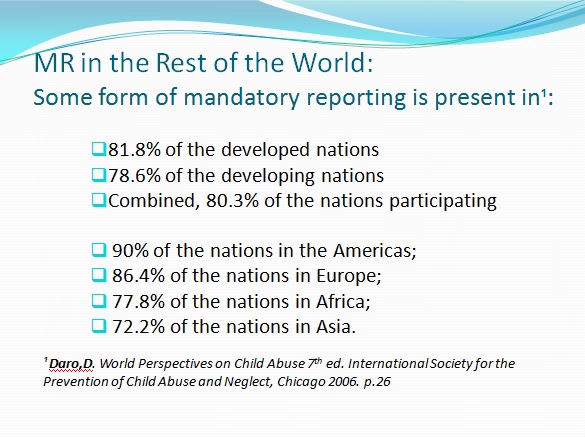
This data was subsequently mined in 1989 by Lamond. Below we provide some of the outcomes that emerged in his article.
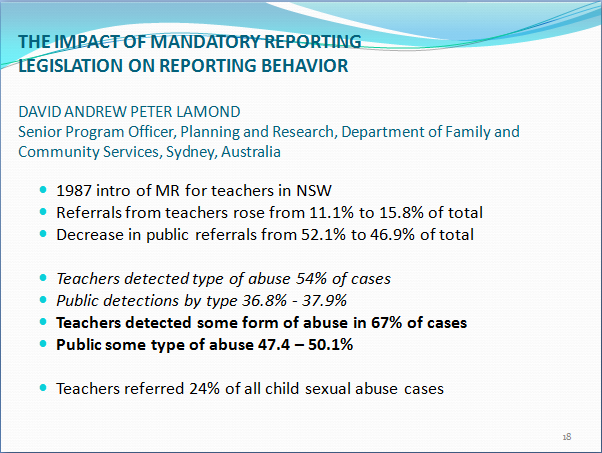
The ‘pipe-dream’ of independent assessment as Dr Nelson puts it, is being delivered in the majority of jurisdictions in the rest of the world. It’s hard to comprehend why UK academics herd their way to the dogmatic dismissal of MR, the collateral cost of its absence being children avoidably left in abusive settings. Professor Radford (UCLAN) was similarly inclined in her unfortunate rapid evidence assessment for IICSA. Only 18% of countries do not have MR, Scotland (also England and Wales) is one of the rarities. Developed countries with effective RA safeguarding wonder what on earth Government and its kennel of biddable children’s NGO’s and social workers are doing and why. Here is an example of how bad things are. And no law was broken by any of the parties involved in these appalling actions (the exception being the abusers themselves). And the Youth Justice Board is heavily funded by the Department for Education which has responsibility for safeguarding.

We concur. Whilst some improvements have since been delivered, there is still a distance to travel. Organisational culture is exceptionally slow to change without a catalyst – usually law. In many overseas jurisdictions police are Mandated Reporters principally for children who are considered at risk as a result of living in households with domestic abuse. But including police (and social workers) is not in our legislative design proposal. (page 3)

We agree with the principle of mandatory training but the need for a ‘disciplinary’ sanction is unexplained and unevidenced. Far more important is the need for safeguarding training of all types to have an accreditation scheme for NGO’s, firms and personnel which deliver this essential service. It’s a matter we raised in the meeting with NSPCC leadership team in chambers at Gray’s Inn 29.6.15. Sadly the NGO did not reply to our letter. Here’s another example of the NSPCC getting it comprehensively wrong when it claimed in print that a ‘legal and moral obligation to report child abuse’ existed. As most have belatedly come to understand there is no legal obligation to report such concerns. Dangerous nonsense like this misled all those to whom the Football Association’s policies were addressed. And as for the policies themselves; absent of law to report they are nothing more than ink on paper, a triumph of hope over reality supported by Government which is keen to see only nominal statutory responsibility for safeguarding and no accountability.

Here is a London Assembly press release Sept 2016 on the first Children’s House to be launched. We look forward to reviewing hoped for data that flows from it to see if it replicates the success of the forerunner service in the Netherlands. But it’s full potential is very limited until referrals are made to the Local Authority / children’s services. Until this initial step is taken child abuse simply continues, a point which seems to get lost along the way.

Well-designed MR is a vital component of functioning safeguarding precisely because reporter doubt exists. Instead of having to go ‘rogue’ and whistle-blow a concern, staff are supported by law that requires them to report and protects the reporter when doing so. MR sees prescribed personnel ‘facing in the same direction’ and consequently a referral becomes a ‘neutral’ act. Any doubt can be resolved one way or the other by means of an assessment carried out by personnel at the local authority who are independent of the setting and who have the training, expertise and authority to do so.
There is a further reason why mandatory reporting is necessary to protect those who report. In a significant minority of settings, reporting is discouraged, either out of disbelief that a trusted colleague could abuse or out of concern for the reputation of the institution. In one case, the England & Wales Inquiry (IICSA) reported that at one school a member of staff with what turned out to be entirely justified concerns had been told “If you know what’s good for you, keep your head down and do your job.” No amount of training will change the attitude of those who know perfectly well what is the right thing to do, but actively choose not to do it.
It is this failed and failing ‘discretionary reporting’ regime in these important settings that is a major contributor to the astonishingly low reporting data that Dr Nelson cites in her Scotsman article. The Children’s Commissioner report of 2015 stated only 1 in 8 cases of child sexual abuse are discovered (12.5%) in England and Wales. Yet Regulated Activities in Scotland, Wales and England are critically important ‘sentinel’ reporters of child abuse which happens away from the setting. But staff are unsupported by legislation. Once again here is the data over a six month period pre / post the extension of Mandatory Reporting to teaching (the largest Regulated Activity in all jurisdictions) in New South Wales in 1987. At the time, just as Scotland has now, there existed a professional expectation that teachers in NSW ‘should’ report concerns. Clearly it wasn’t working. Thirty-three years later teachers in Scotland, England and Wales remain stuck on the nursery slope of RA safeguarding – reporting abuse is merely a professional ‘expectation.’

MR is not a big stick. Once again this comment misrepresents MR and demonstrates non-comprehension of the subject. Here’s further evidence for consideration :
- IICSA MR seminar #2 – presentation 1
- IICSA MR seminar #2 – presentation 2
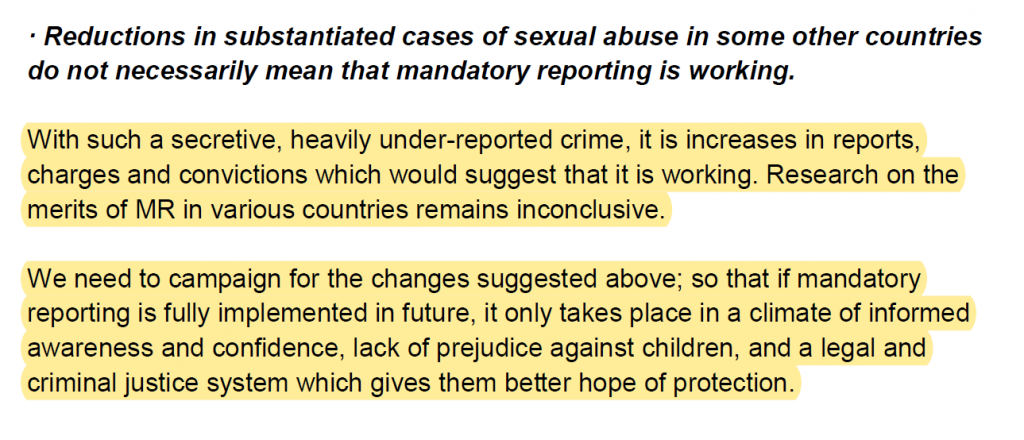
In the first of these paragraphs’ Dr Nelson again expresses opinion absent of any supporting evidence. It’s a surprising contribution from an academic. It’s hard to know quite where to begin. ‘Substantiations’ are not a measure of ‘success,’ whatever that is. Academics in jurisdictions in which MR exists tend to have an appreciation of this. Furthermore, substantiation of what? Well, that depends on the design of the legislation which of course varies significantly in each jurisdiction and can vary over time even within a single jurisdiction as thresholds are manipulated for political purposes. Instead of commenting further we provide citations to essential reading about ‘substantiations.’
The final paragraph makes a sound point about the criminal justice system. It’s in a shocking state. Austerity is a major contributor to current situation.
Taken as a whole, Dr Nelson’s submission to the petition was a curates egg, the parts that are bad are loaded with dogma that should be accompanied by a health warning. She’s not alone in this mindset, it’s default social worker narrative. Unfortunately the MR naysayers have become a retardant to the development of a far more effective safeguarding framework. Only a handful of social workers known to us have been deeply involved in the delivery of safeguarding in complex Regulated Activities. In evidence to IICSA each indicated well-designed mandatory reporting is essential. The IICSA Catholic Hearing, which included the decades of failure at Downside, was particularly memorable for this happening. Dr Nelson’s anti-MR stance is grounded on opinion rather than the significant depth of MR evidence that exists. As a result her position fails the very people we are certain she seeks to safeguard.
